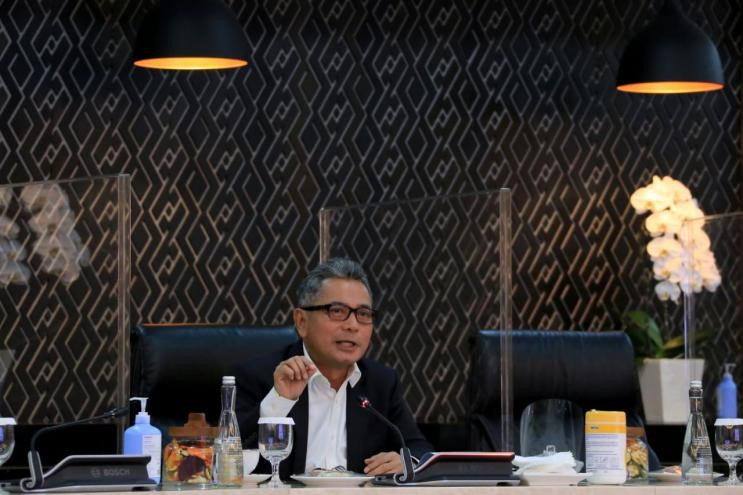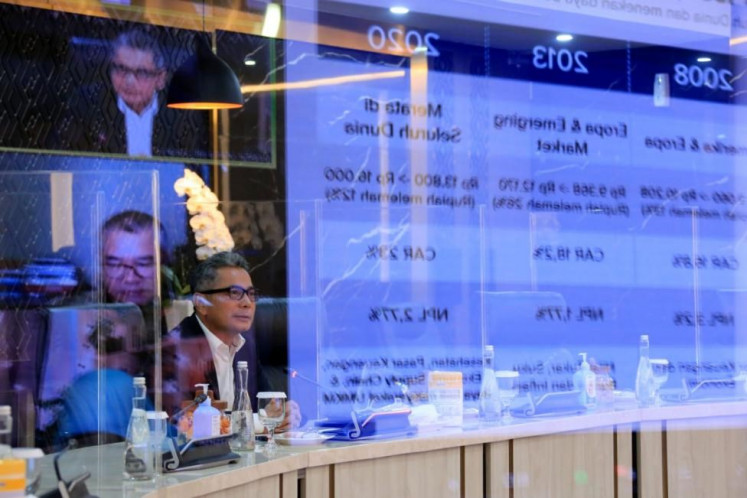Popular Reads
Top Results
Can't find what you're looking for?
View all search resultsPopular Reads
Top Results
Can't find what you're looking for?
View all search resultsBRI takes concrete steps to accelerate MSMEs business recovery
Change text size
Gift Premium Articles
to Anyone
S
pecial attention should be paid micro, small and medium enterprises (MSMEs) amid the COVID-19 outbreak given that they serve as the backbone of the national economy.
A survey conducted by the Cooperatives and Small and Medium Enterprises Ministry revealed that it received reports from 37,000 MSMEs that they had been severely hit by the COVID-19 pandemic.
These explain why state-owned lender PT Bank Rakyat Indonesia (Persero) Tbk (BRI) has once again reiterated its commitment to help the national economic recovery amid the COVID-19 pandemic by helping MSMEs accelerate their business recovery through various financial initiatives.
BRI president director Sunarso said, “it is important for us to safeguard MSMEs, helping them revive their businesses, to help restore the national economy.”
“About 99.99 percent of Indonesian business entities belong to the MSME category. MSMEs also play a significant role in labor absorption, as 97 percent of the entire Indonesian workforce, comprising 116.97 million individuals, works for the MSME sector,” he explained.
The ministry’s survey went on to say that around 56 percent of the troubles reported by local MSMEs are related to declining sales, 22 percent to funding, 15 percent to goods distribution and 4 percent to access to raw materials.
The troubles were related to various obstacles caused by requirements to conduct physical distancing and various large-scale social restriction policies, which disrupt normal business activities.
“Currently, our MSMEs are going through a significant business slowdown – some of them have even gone through a shutdown due to a significant decrease in human interaction among people, causing economic activities to decline,” he said.
“[This economic decline has been] accompanied by a decline in purchasing power among individuals, which has caused consumers to take austerity measures, spend their money for basic consumption only,” he added.
Keeping this context in mind, Sunarso said, BRI had decided that food resilience was an important area of intervention amid the economic slowdown brought about by the pandemic.
“Although we don’t necessarily know when this crisis will be over, BRI has taken steps to make sure that we don’t run out of food supply. We’re pushing for economic resilience from the food supply route,” Sunarso explained in a recent online discussion in the Center of Reform on Economics (CORE) Economic Forum.
The forum, organized by the CORE think tank, was conducted on July 15, carrying the theme of the important role of the banking sector in pushing the MSME sector forward amid the pandemic.
During his panel in the forum, Sunarso said that BRI attempted to promote food resilience by providing several financial stimulations to MSMEs whose main business line was food. This covers MSMEs that sell and distribute food products or operate as restaurants.
One of BNI’s concrete steps to safeguard MSMEs is helping them with loan restructuring, in line with the Financial Services Authority’s Regulation No. 11/2020. Between March 16 and July 6, BRI has approved loan restructuring requests worth Rp 177.3 trillion (US$12.1 billion) submitted by 295,617 MSME borrowers impacted by COVID-19.
On June 24, the government, through Finance Minister Sri Mulyani Indrawati disbursed a fund totaling Rp 30 trillion to the State-Owned Banks Association (Himbara). Out of the total amount, BRI received Rp 10 trillion. Between June 25 and July 15, BRI disbursed loans for government fund allocation worth Rp 13.59 trillion with 295,617 borrowers as recipients.
Sunarso added that BRI attempted to leverage the funds that the government had placed in the bank, multiplying the funds by three times to put the real sector into motion and accelerate the national economic recovery.
Furthermore, BRI has also disbursed an additional microcredit interest stimulus to more than 211,477 borrowers, worth a total of Rp 12.97 billion.
“This crisis has accelerated BRI’s innovations; we have created separate ecosystems for market, villages and digital businesses. For the market ecosystem, we have created an online marketplace, which allows goods from the village to be distributed to the platform, allowing them to access consumers who buy these products online,” Sunarso said.
“Furthermore, we have also taught our vendors how to use the digital application, deliver the purchased goods using couriers and teaching their couriers to handle these goods – in other words, we’re helping to digitalize the operations of traditional markets,” he continued.
BRI also continues to expand its online marketplace for traditional merchants on a national level. BRI plans to increase the number of its online platform merchants from 3,983 entities to 5,241 entities. BRI will designate one mentor to help educate each online merchant on how to transform his or her business online.
Recovery talks: PT Bank Rakyat Indonesia (Persero) Tbk (BRI) president director Sunarso speaks in a panel about inter-stakeholder collaboration to push local micro, small and medium enterprises forward in an online forum organized by the Center of Reform on Economics think tank on July 15. (Photo courtesy of BRI/.)According to Sunarso, BRI’s strategic steps outlined above will hopefully restore the economic resilience of MSMEs that have been severely devastated by COVID-19, an important ingredient in the Indonesian economic recovery.
Hopefully, he added, this would help turn the economic wheels of the real sector, which is part of the value chain and comprises distribution, transportation and trading.
“We need to make sure that the economic wheels will resume normal rotation, accelerated by the food sector. MSMEs will need more support in education and guidance [from more experienced players] so that they can serve as equal partners with financial institutions. Therefore, let us manage the MSMEs properly and correctly,” he said.
Meanwhile, Institute for Development of Economics and Finance (Indef) senior economist Enny Sri Hartati added that due to the COVID-19 pandemic, many economic activities that were previously able to produce revenue had been hindered, while the business sector was facing liquidity and cashflow disruption.
“To overcome our current crisis situation, we need more than just capital injections. We need to consolidate inter-stakeholder synergy among primary economic actors properly. We need a concrete program [to accelerate MSMEs’ business recovery], if we still agree that the MSME sector is the main pillar of our economy,” Enny said.
On the other hand, according to CORE research director Piter A. Redjalan, our success in preventing a full-blown economic crisis as a result of the pandemic can be measured in our ability to maintain the sustainability and continuation of the real sector, all the while preserving the stability of the financial sector.
“The credit-restructuring policy will help the business scene thrive while also aiding the financial sector all the same. The government has already reached a wide segment of Indonesians with its comprehensive policies. What we need to do now is to work hand-in-hand to maintain the sustainability business and financial sector through close collaboration. In this case, inter-stakeholder synergy is absolutely needed,” Piter said.











